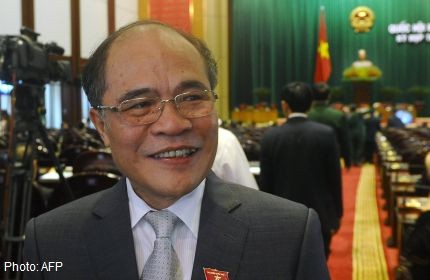Vietnam Communist Party reasserts role in amended charter

HANOI - Vietnamese lawmakers on Thursday approved a new version of the country's constitution that upholds the ruling Communist Party's dominant political and economic role.
"This is an historic moment," said Nguyen Sinh Hung, chairman of the National Assembly, after the charter was approved by 486 votes out of 488 deputies present, with two abstentions.
The amendments make minor tweaks to the constitution but crucially reaffirm the central role of the Communist Party - which has been enshrined in the document since it was first approved in 1946.
But the process of amending the charter had raised hopes of real change after it was opened to public debate, sparking fierce discussion on topics usually taboo in the nation.
A group of leading academics in January submitted a petition calling for multiparty democracy, respect for human rights, private land ownership and an apolitical army that served the people not the party.
The main demand of the academics and many online commentators was for the abolition of Article 4, the clause that protects the party's power, and for a clear separation of powers between the legislative, executive and judicial branches of government.
But that section has not been removed, according to a version of the constitution read out in parliament, although a final amended text was not available early Thursday.
"The majority of opinions expressed during the consultation process agree the party should continue to play a leading role," said Uong Chu Luu, vice-chairman of the National Assembly, in a televised speech Thursday.
Some 25 years after the party initiated market reforms, Vietnam is mired in an economic slowdown widely blamed on mismanagement.
In a bid to seem progressive, its rulers regularly ask for public input on policy issues.
Campaigners expressed cynicism over the practice.
"The call for consultation was a trap to lure opponents of the party out of the shadows," Nguyen Van Tam, a 48-year-old Catholic activist told AFP after the vote early Thursday.
The party tightly controls public debate and routinely imprisons dissidents who question the political system or call for change.
But Jonathan London of the Department of Asian and International Studies at City University of Hong Kong said the fact there had been an open debate over the amendments was significant.
"The rules of the game regarding politics in Vietnam have changed," he said.
"It was not intended but (the consultation period) gave rise to an extended debate of the sort Vietnam has never seen under the Communist Party rule."
New York-based Human Rights Watch (HRW) criticised the National Assembly for acting as a rubber stamp and not taking into account the wishes of the Vietnamese people.
"Once again, the Vietnam government and Communist Party cynically chose maintaining political power over respecting rights and giving the Vietnamese people a real say in governance," Phil Robertson, HRW's Deputy Director for Asia told AFP.
"This was an opportunity lost, pure and simple," he added.
Founded in 1930, Vietnam's Communist Party led the country to independence from the French and then to victory over the Americans in a decades-long bloody war.
It has ruled unified Vietnam as a one-party state since 1975.